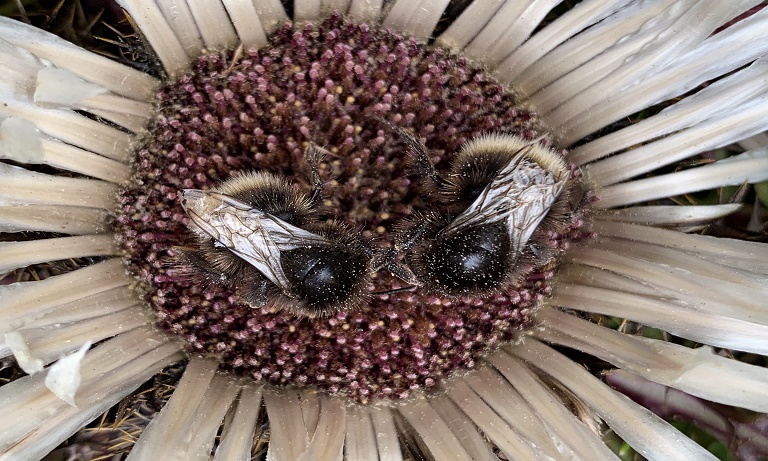Standing up for the veterinary profession
08 Aug 2024
24 Feb 2022 | Barnaby Coupe
Bees are a vital part of our ecosystem, but are threatened by pesticides from a wide range of sources. In this blog, The Wildlife Trusts’ Land Use Policy Manager, Barnaby Coupe, explains why they are concerned about the Government decision to allow the use a banned pesticide once again, and how vets can help protect this important insect.

The Government have decided to go against their own expert advice and allow the use of a banned neonicotinoid pesticide on sugar beet in 2022. While the Government insist that this authorisation is for “emergency” use only, it could signal a worrying return of the routine use of these extremely toxic chemicals in the UK.
Neonicotinoids are known as ‘neurotoxic’ pesticides, disrupting the nervous systems of insects and ultimately leading to their paralysis and death. These chemicals are not pest-specific – as well as the target pest, they affect non-target insects including important pollinators like bees. There is an overwhelming stack of evidence showing that neonicotinoids are highly toxic to bees, and Professor Dave Goulson from the University of Sussex has warned that a single teaspoon of this type of chemical is enough to kill 1.25 billion honeybees - equivalent to four lorryloads.
As well as directly killing important pollinators, there are also a range of ‘sub-lethal’ effects, where low doses may instead hamper their ability to navigate, forage, and reproduce. A study published last year found that just one exposure to a standard dose of a neonicotinoid was enough to cause bees to have significantly fewer offspring, and those who experienced a second dose of the chemical in the following year had their population growth rates reduced by 72%. Another study found that small doses of neonicotinoids affect the ability of honeybees to form memories, meaning they are more likely to lose their way and never return to the hive.
The unintended consequences of neonicotinoid use can be far-reaching and severe, and the evidence base supporting this has only grown since an EU-wide ban on neonicotinoids in agriculture in 2018.
Yet, in January this year, Defra issued an emergency authorisation for the use of a neonicotinoid seed treatment for sugar beet due to concerns that a virus spread by aphids may reduce sugar yields. By granting this authorisation, the Environment Secretary George Eustice went against the explicit advice of the Health and Safety Executive and the Expert Committee on Pesticides, independent expert advisors appointed by the Government to provide evidence-based direction on decisions like this.
Both groups of experts concluded the risks to bees and other pollinators outweighed any benefits that would arise from using the neonicotinoid and raised concerns about the pesticide polluting our water and wider environments. Both groups advised that it should not be authorised, only for this advice to be ignored. Now, this extremely harmful pesticide is destined for use on almost 100,000 hectares of sugar beet fields in England.
The decision to authorise the use of a banned neonicotinoid is a bitter blow to bees and a wealth of other wildlife. The majority of the neonicotinoid active ingredient applied to sugar beet has been shown to leach from the seed into the soil, polluting the wider environment where the sensitive balance of our ecosystems is already under threat from a myriad of chemicals as a result of agricultural runoff, wastewater from sewers, and animal treatments (such as flea treatments for cats and dogs, and parasiticides in livestock).
There is increasing evidence that this “cocktail effect”, arising from the accumulation of multiple different chemicals in the environment, leads to more harmful environmental impacts. The decision to allow a banned neonicotinoid to be used in 2022 is likely to make this problem even worse. The cocktail effect has been shown to make neonicotinoids like thiamethoxam up to 1000 times more deadly than when they are used on their own.
Rather than continuing to add to the mix of insecticides, fungicides, parasiticides, and other chemicals flooding our natural spaces, the Government should instead be supporting chemical users to adopt alternative methods such as Integrated Pest Management, and investing in research and innovation into new, more environmentally conscious interventions.
In the face of the multiple pressures that threaten them, our bees and wildlife need all the support they can get. The Wildlife Trusts are calling on the Government to listen to their experts and recognise that banned neonicotinoids should stay banned, and not be used on our crops. You can support the campaign by following this link to contact your MP, and ask them to call on the Government to reverse the decision. You can also get involved with the BBVA’s Bee-Friendly Practice Scheme, which aims to promote initiatives that give our declining bee populations a helping hand.
Get tailored news in your inbox and online, plus access to our journals, resources and support services, join the BVA.
Join Us Today